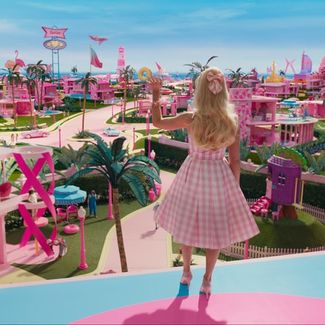
In a Barbie World: How Mattel's savvy brand licensing has turned the planet pink
Paint it pink ... we delve into Mattel’s masterful licensing ploys
20 July 2023
Whether you like it or not, we are currently all Barbie girls living in a Barbie world. From the Oppenheimer vs Barbie debate, to harnessing Ryan Gosling’s Ken-ergy, everything Barbie themed has painted the globe pink in the lead up to Greta Gerwig’s highly anticipated movie release tomorrow. The Margot Robbie-led film is set to catapult the Mattel-owned brand’s revenue - the movie's opening weekend is forecast to take between $450m and $550 m worldwide.
But the brand’s real not-so-secret commercial weapon is brand licensing. The Barbie movie itself can be seen as the multi-million pound marketing campaign (though of course Mattel has also pursued a case-study worthy marketing strategy for the movie) and the brand collaborations are the products. In the last few months, Mattel has partnered with countless brands, ultimately begging the question of suitably-matched companies - if you’re not collaborating with Barbie what are you doing?
While it does seem that the brand is delivering a masterclass in marketing, the Barbie story is also one of rejuvenation. In 2015, the brand reported its lowest sales figures in over 25 years, with CNN even claiming that Barbie was ‘dead’. For years the brand had been facing criticism for failing to address a lack of inclusivity and for the gender stereotypes the dolls encouraged.
“When we allowed Barbie to get complacent about the realities of a rapidly changing world, we unintentionally failed girls, misunderstanding how valuable it was for every girl to see herself and her world reflected in her Barbie dolls,” Richard Dickson, president and chief operating officer, Mattel, told Brand Licensing Europe in 2022.
In a bid to salvage a brand that was in danger of going out of fashion, Mattel quickly embraced inclusivity and empowerment which influenced everything from messaging to design and execution. As a result, Barbie not only went on to produce dolls with seven skin tones, 22 eye colours and 24 hair types, but the company also managed to double its doll sales to $1.7 billion in 2021.
On top of this, in recent times a raft of licensing partner deals and the production of a blockbuster film has undoubtedly cemented Barbie as a brand that’s here to stay for many years to come.
“As one of the most buzzed-about film releases in recent times, ‘Barbie’ has dominated the zeitgeist for months,” says Josh Silverman, chief franchise officer and global head, consumer products, Mattel. “This historic moment for Mattel creates incredible fanfare for our partners and consumers alike; we are eagerly looking forward to the film’s release and sharing the multitude of new ways Barbie fans worldwide can celebrate this iconic moment.”
In the build up to the release of the film, Mattel has collaborated with key consumer, fashion, merchandise and retail brands such as Pinkberry, Fossil, Forever 21, Gap, Funboy, Aldo and Hot Wheels.
Media owner Global has also wrapped buses in pink and displayed Barbie’s partnership with Boohoo across Transport for London’s (TfL) network.
Several further tie ups have also gone viral online, with Airbnb’s Barbie Dreamhouse piquing the interest of many fans. The pink mansion - hosted by Ken and available to rent in Malibu - features a disco roller rink, a giant pink slide and a huge swimming pool. Fans of the doll can also stay in the mansion for free.
Most recently, Burger King Brazil took social media by storm when it unveiled its Barbie Burger. The exclusive item of food is seen to be oozing a pink sauce.
Gaming brand Xbox has also made Barbie a gamer. In collaboration with Warner Bros. Pictures and Mattel, Xbox recently unveiled a series of exclusive products including Forza Horizon 5 in-game content, the first ever Xbox Barbie dolls, and custom Xbox hardware. By partnering with 'Barbie The Movie,' Xbox has said it hopes to motivate young girls in following their passions and highlight careers in STEM and gaming.
“Our partnership emphasises the importance of inclusivity and representation which leads to more diverse audiences getting to experience the joy of gaming,” Kirsten Ward, Vice President of Integrated Marketing, Xbox, told Creative Salon.
The collaboration is an apt example of brand licensing’s power in expanding the reach of a brand not only for revenue growth but also for encouraging inclusivity and diversity.
“Barbie is one of the most recognised brands in the world and with the release of ‘Barbie the Movie’, Barbie-mania has been at an all-time high,” Ward continues. “Warner Bros. and Mattel have done a wonderful job tapping into the nostalgia of fans who have grown up playing with Barbie as well as younger generations who currently look up to Barbie as a role model. The brand has been able to authentically expand the Barbie universe and reach new audiences with all that there is to love about Barbie: her persevering optimism, wide-ranging career journey and never-ending capacity for self-discovery. Xbox is grateful to be working with Warner Bros. to celebrate ‘Barbie the Movie’ which highlights mutual core values our brands share – such as diversity and inclusion and inspiration through play.”
The raft of licensing deals Mattel has secured off the back of the Barbie movie-hype is a testament to the power of combining the entertainment world with the marketing industry. People outside of the advertising sphere are even praising the movie's marketing. Now how often does that happen?







